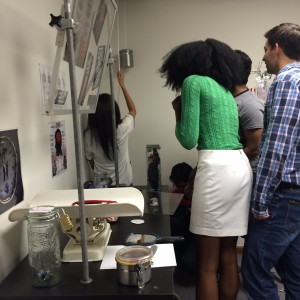‘Room Escape Atlanta’ offers thrills and team-building skills

Written by Jen Schwartz and Tonesa Jones
A select few members of The Connector’s staff experienced “Room Escape Atlanta’s” “Trapped in the Donor Room,” a room escape experience available year-round. Here are thoughts on the experience from Editor-in-Chief, Jen Schwartz, and Opinions Editor, Tonesa Jones.
Jen, on the experience:
Being creative people, it shouldn’t come as a surprise that many of us art students have been known to fantasize about existing in different realities from time to time, be that an entirely different realm where mythical creatures roam or something a bit more grounded in reality like becoming a member of the royal family. Books and movies can be a great way to temporarily transport yourself into the worlds of various characters, but simply observing these worlds isn’t the most engaging. Simulation games are a fun alternative that actually allow you to interact with characters, but picking from options A, B, or C doesn’t exactly aid you in losing yourself in a story. These pastimes might suffice for the casual daydreamer, but if you’re looking to fully immerse yourself in another reality I suggest checking out “Room Escape Atlanta.”
“Room Escape Atlanta” offers fully interactive experiences, like “Trapped in a Room with a Zombie” and their more recent addition, “Trapped in the Donor Room,” where you and other attendees must escape from a locked room by finding clues and solving puzzles within 60 minutes, lest you be left to deal with your fate (i.e. get eaten by a zombie or be a live organ donor). I can’t speak for attempting to escape from a locked room while in close quarters with a hungry zombie, but finding your way out of the Donor Room is no easy feat.
Having very little information about what exactly I was getting myself into, I imagined a dimly lit operating room with clues Sharpie’d on scalpels or taped to the inside of a bedpan; a somewhat eerie environment, but relatively low-stress. What I was not expecting was to be trapped in the room with one of the deranged doctor’s patients in full-on freak-out mode, but that’s exactly what I got. Racing against the clock to solve puzzles with your colleagues is one thing, but doing so whilst a hysterical captive shrieks intermittently makes the task a bit more challenging. At first I found this unexpected addition to be quite the annoyance and went out of my way to let her know I wouldn’t take her seriously or let her be a distraction (when she frantically asked, “Who are you people?!” I deadpanned, “I’m Jen, from ‘The Connector’”) but eventually I came to appreciate her inclusion, as our team wouldn’t have even come close to success without her helpful suggestions.
Being a big horror fan I wasn’t expecting to get too spooked by a room escape, especially one that isn’t a huge production, but “Room Escape Atlanta” makes the most of what materials and space it does have and managed to effectively scare each one of our participating staff members at least a few times. Even once the room’s fluorescent lights were turned on and took us out of the darkness, the atmosphere remained ominous without the knowledge of what exactly we would find once we opened and unlocked various objects.
“Room Escape Atlanta” was an interesting experience, but the attraction has more to provide than simple entertainment.

Tonesa, on the room escape’s effect on team-building:
“Room Escape Atlanta” allows you and your teammates to answer the age-old question: what kind of person would you be in a group in the post-apocalyptic world? I don’t want to admit this, but I was sufficiently spooked by the theatrics of the actors that I did not want to be the one to take the lead, though I hold that if no one had stepped up, I would have reluctantly taken the role. The environment of the organ donor room makes you feel endangered enough that survival instincts kick in. Did I want to be the one to stick my hand in the creepy box? No. I was definitely not the team member who took charge or risks.
This can be either the most rewarding or most frustrating thing about this experience: learning how individual personalities can function in a team under pressure. The one-hour time limit can be testing if everyone has difficulty getting along or if some members of the team get frustrated and quit trying to solve the puzzle. A successful team will have a leader, someone willing to take risks, someone who motivates, or someone who is persistent in spite of fear. Above all things, communication is key. A team that doesn’t talk to each other will most likely been eaten by the mysterious doctor. Luckily, our team had everything we needed to work together, even though in the end we failed to escape the room.
























